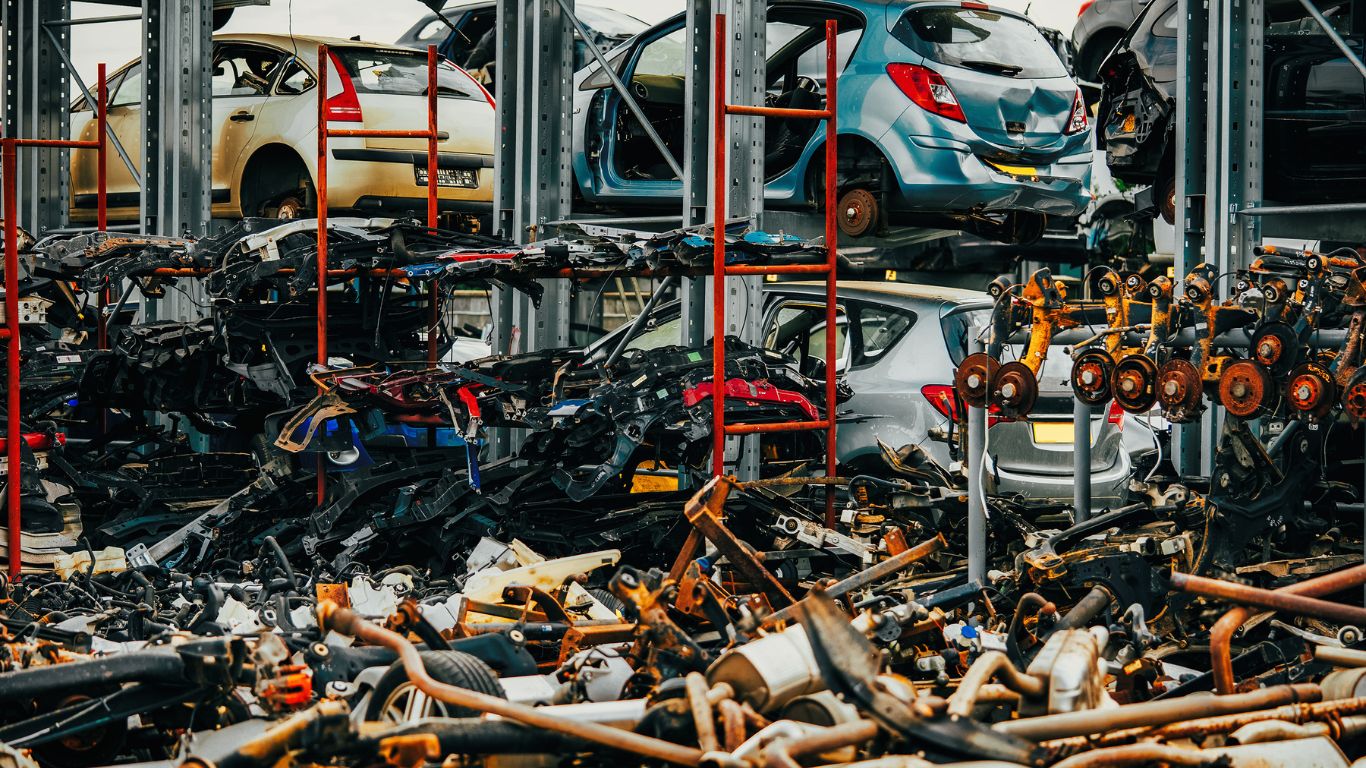Have you ever wondered, “can you sell car parts to a junkyard?” Whether you’re cleaning out your garage, dismantling an old vehicle, or looking for a way to profit from used car parts, selling them to a junkyard could be a great option. Junkyards are always on the lookout for reusable parts, but not everything qualifies. In this article, we’ll explore the steps to take when selling car parts, the parts that are most valuable, and some important things to keep in mind to get the best deal.
Can You Sell Car Parts to a Junkyard?
Selling car parts to a junkyard is absolutely possible. Many junkyards, also known as auto salvage yards or scrap yards, will buy used car parts if they are still in good working condition. However, Car Parts are in high demand, and each junkyard has its criteria for purchasing these parts. Whether you’re selling something as small as a side mirror or as large as a transmission, there’s potential to earn money from parts that are no longer needed for your vehicle.
Popular Car Parts That Can Be Sold to a Junkyard
When selling car parts to a junkyard, certain components have more value than others. Here’s a list of the most sought-after car parts by junkyards:
1. Engine Components
-
Engines: Engines are one of the most valuable car parts you can sell to a junkyard. If the engine is in good working condition, it can fetch a high price. Junkyards typically seek engines for reuse or recycling, especially for popular car models where spare parts are in demand.
-
Alternators: Alternators are essential components that convert mechanical energy into electrical power for a vehicle. If in good working condition, they are highly sought after by junkyards. Many junkyards recycle or refurbish alternators, as they are crucial for various car models and can be resold at a good price.
-
Radiators: Radiators are key components in a vehicle’s cooling system, preventing the engine from overheating. Junkyards often accept radiators in good condition, either for reuse in other vehicles or to be recycled. Copper and aluminum radiators are especially valuable due to the metal content, which can be sold as scrap.
2. Transmission and Gearbox
Transmissions are a valuable part of the vehicle. If it’s in working order, a junkyard may pay top dollar.
3. Car Doors and Windows
-
Doors: Car doors, especially those in good condition, are valuable items for junkyards. They can be resold for Vehicle Parts Lookup Services or repurposed for other uses. If the door is free of rust, dents, and functional, junkyards will often offer a reasonable price for its metal content and usability.
-
Windows: Car windows, particularly those free of cracks and chips, are valuable to junkyards. They can be reused in other vehicles or sold as replacement parts. Junkyards often pay for intact windows, especially those made from tempered or laminated glass, which can be recycled or resold for car repairs.
4. Car Batteries
Car batteries are commonly accepted by junkyards for recycling. Even if the battery is no longer functional, it can be valuable for its lead content and other reusable materials. Junkyards often offer payment based on the weight and condition of the battery, and some may even refurbish them for resale.
5. Tires
Tires in good condition are often sought by junkyards, especially if they have plenty of tread left. Junkyards may refurbish and resell them or recycle the rubber. Even used tires with some wear can be valuable, depending on their size, brand, and condition, offering a decent return for sellers.
How Do Junkyards Determine the Value of Car Parts?
Junkyards generally evaluate car parts based on a few factors:
Condition of the Part
The condition of a car part plays a crucial role in determining its value at a junkyard. Parts that are in good working order, free from damage, rust, or excessive wear, are generally worth more. Well-maintained parts can be resold or reused, while those in poor condition may only be valuable for scrap metal.
Market Demand
Market demand significantly influences the value of car parts at junkyards. Parts for popular car models or commonly replaced components, like alternators or engines, are typically in higher demand. Junkyards are more willing to pay well for parts that are frequently needed for repairs or refurbishing, ensuring they have resale potential for customers.
Scrap Metal Value
Scrap metal value refers to the price that junkyards pay based on the weight and type of metal in a car part. Even if a part is no longer functional, its metal content can still be valuable. Junkyards often assess the market price for scrap metal, such as aluminum, copper, or steel, to determine payment.
How to Sell Car Parts to a Junkyard
Know Your Parts’ Value
Before selling car parts to a junkyard, it’s essential to research their value. Understanding the market demand, condition, and potential for reuse can help you negotiate a fair price. Check online marketplaces or scrap metal prices to get a sense of what your parts are worth, ensuring you maximize the return on your sale.
Remove the Parts
Properly removing car parts is key to maximizing their value. Take care to avoid damaging them during removal. If you’re unsure how to safely dismantle components like the engine, transmission, or doors, consider consulting a professional mechanic. The better condition the parts are in when sold, the higher the potential payout from the junkyard.
Contact Local Junkyards
Reach out to multiple local junkyards to compare offers for your car parts. Some may specialize in specific components, while others may offer better prices based on current inventory needs. Contacting several junkyards ensures you get the best deal. Be prepared to negotiate and provide details about the parts’ condition and make.
Negotiate the Price
Negotiating the price with junkyards is an important step to ensure you get the best deal. Be ready to discuss the condition and value of the parts you’re selling. Don’t accept the first offer—junkyards expect some bargaining. Knowing the market value of your parts can help you confidently negotiate for a higher payout.
What to Keep in Mind When Selling Car Parts to a Junkyard?
Know the Laws in Your Area
Before selling car parts to a junkyard, it’s essential to be aware of local laws and regulations. Some areas require proof of ownership or a title for specific parts. You may also need to provide identification or follow specific documentation procedures. Familiarizing yourself with these laws ensures a smooth and legal transaction.
Clean Your Parts
Cleaning your car parts before selling them to a junkyard can increase their value. Parts that are free from dirt, grease, and rust appear more valuable and are easier to assess. Taking the time to clean parts like engines, alternators, or wheels can help you get a higher price and make a better impression.
Understand the Difference Between Selling to a Junkyard vs. a Private Buyer
Selling to a junkyard is quick and convenient, offering immediate payment, but the price may be lower due to their need for resale or recycling. On the other hand, selling to a private buyer, such as through online platforms, can yield a higher price, but it requires more effort, negotiation, and time to complete the sale.
FAQs
Q: Can I sell any car part to a junkyard?
A: Not every part is valuable enough to sell to a junkyard. Parts that are in working order and in high demand, such as engines, transmissions, and car batteries, are typically accepted.
Q: How much can I get for car parts at a junkyard?
A: Prices vary depending on the part, its condition, and market demand. For example, a working engine could fetch several hundred dollars, while a piece of scrap metal might be worth less.
Q: Do junkyards pay in cash?
A: Many junkyards pay in cash, though some may issue checks or use other payment methods. It’s always a good idea to check with the junkyard ahead of time.
Q: Can I sell car parts without a title?
A: In some cases, you can sell car parts without a title, but it depends on your local laws and the junkyard’s policies. It’s always best to check before proceeding.
Q: Is it better to sell parts online or to a junkyard?
A: It depends on the parts and your preferences. While junkyards are convenient, selling parts online can sometimes yield a higher price if the parts are in demand.
Conclusion
In conclusion, selling car parts to a junkyard can be a profitable and eco-friendly option when you have parts that are no longer needed. By understanding which parts are most valuable, researching the market, and negotiating with local junkyards, you can maximize your profits. Whether you’re cleaning out an old vehicle or simply getting rid of car parts that are taking up space, junkyards can be a great place to start.


